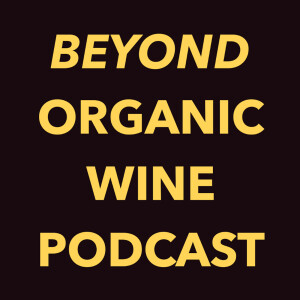

This episode is the last of the Quebec series, and it’s such a great one to end with… because it makes me miss Quebec and want to go back for a visit again as soon as possible. This one is special for several reasons: first, I got to interview a family… or part of the family who farms and makes wine as Vignoble Pigeon Hill. Kevin, Matthew and Trisha Shufelt treated Maxime and me to a beautiful tour, tasting, and conversation. And we finally got to see some sheep in action in the vineyard! And we got to hear a lot about how they make sheep work at Pigeon Hill, from the size of the flock, to why sheep are better than deer for eating, to frequency of movement, breeds, parasites, using winter hay feed to compost the vines. We also talk about frost seeding of cover crops, we meets some pigs who are living at the vineyard forest edge. Kevin tells a fun story about Elmer Swenson and why you have to be careful when planting Lacrosse and St. Pepin. We discuss a lot about the differences in the growth and resistances of the hybrid varieties, and how they’ve learned to pay attention, get to know their vines, and prune, train, trellis and canopy manage them somewhat individualistically, according to the needs and proclivities of the vines. They aren’t farming by recipe, but by learning their vines, paying attention, seeing how the individual differences benefit the whole and provide contingencies. We get some real talk about the challenges of organic farming in Quebec, and how sometimes it’s like being an exhausted marathoner and staggering over the finish line at harvest. And I found it really exciting that Trish got into wine because of learning about regenerative farming. Her excitement, and all of theirs really, for the health of their soil and plants and animals and fostering biodiversity was incredibly encouraging… it gave me hope, honestly, and I wish I could show you their farm so you could see how it reflects their enthusiasm and care.
The other thing I wish I could show you rather than tell you about is the side by side comparison of their vinifera rows and their hybrid rows. The hybrids can grow up on a high wire cordon, so the sheep can easily graze among the vines all year and the understory plants grow long and lush, pulling down CO2 and enriching the soil health and biodiversity in multiple ways. The vinifera must be grown low to the ground, and because of this it must be mowed in the alleys and tilled in the rows. Tending the hybrids is pleasant and ergonomic, while tending the vinifera requires constant stooping or kneeling, and Kevin talks about praying to Pinot…. And the vinifera requires significantly more sprays 5 to 10 times as much as the hybrids, and they must be covered with geotextiles… another expense… in the winter. But Pigeon Hill feels compelled to grow some vinifera because the market, our dominant wine culture which I call "vinifera culture," still demands it. And the side by side comparisons are so stark it’s hard not to see the absurdity of our prejudices that make this kind of viticulture necessary.
I haven’t even mentioned their Marquette. It’s one of their favorites… Kevin kind of fell in love with wine because of Marquette… and now they’re making what I would argue are some of the best Marquettes in the world.... and they’re almost zero zero. Tasting one of Matt’s inspirations in the cellar gave me confidence there will be more world class wines for years to come from pigeon hill.
https://vignoblepigeonhill.com/en/
If you like this podcast, please subscribe & leave a great review.
You Can Support this podcast by subscribing via patreon.
Or by donating or taking action at:
Beyond Organic Wine
or just spread the word... thanks!
More Episodes
All Episodes>>Create Your Podcast In Minutes
- Full-featured podcast site
- Unlimited storage and bandwidth
- Comprehensive podcast stats
- Distribute to Apple Podcasts, Spotify, and more
- Make money with your podcast












